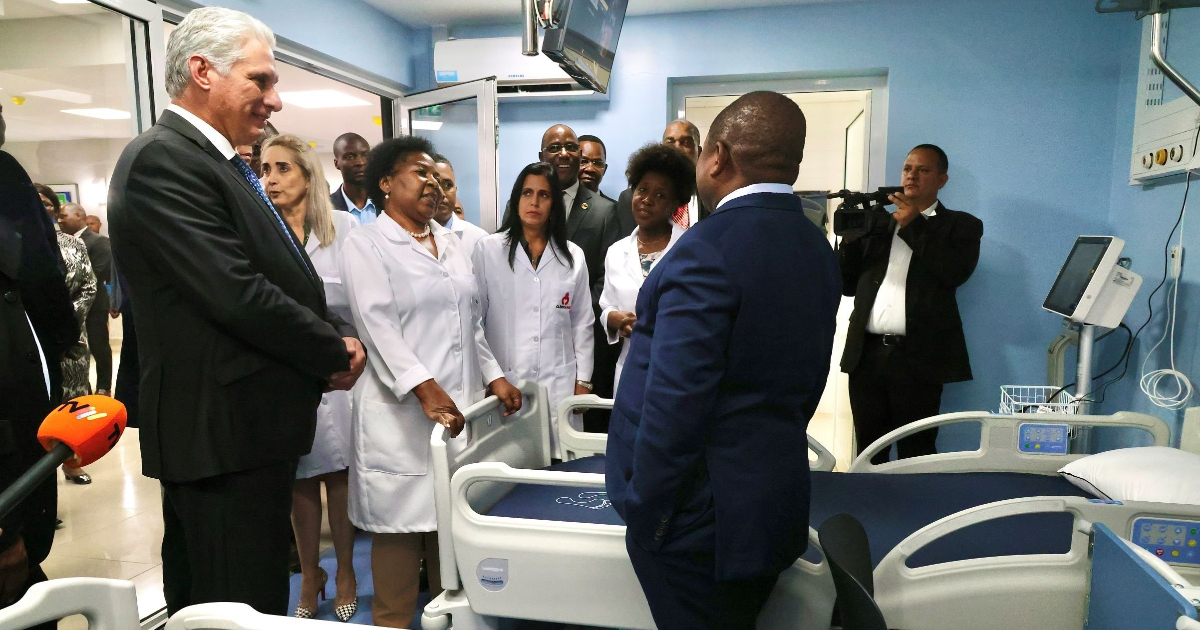
The governorMiguel Diaz-Canel He toured a modern hospital center in Mozambique built with advice from Cuban health professionals and specialists in the care of people with diabetes, while in Cuba many of these people do not even have insulin.
Visiting Mozambique as part ofhis recent tour of African countries, the Cuban leader toured areas of the “Marcelino dos Santos” Clinic, a modern hospital center that is getting ready to begin operating soon.
Accompanied by the Mozambican presidentFill your eyebrows, Díaz-Canel listened to Cuban specialists who work “in advising on this joint project between both countries.” According toPresidency of Cuba, “several of the members of the center are Cuban collaborators, while others were trained or prepared in Cuba.”
The “Marcelino dos Santos” hospital will put into practice the experiences of the Cuban National Health System associated with the treatment of diabetes, including the use of Herberprot-P, indicated for the treatment of diabetic foot ulcers.
The authorities of both countries hope that the hospital will become a reference for Mozambique, and for other nations in the area.
At the beginning of June,A Cuban mother demanded answers due to the lack of insulin and vaccines for children, according to a complaint published on social networks.
"Ministry of Public Health of Cuba, what happens with the children's vaccine? What happens with the insulin for diabetics?" he asked.Isleibis Rodriguez Leiva.
The outraged mother said that her mother was an insulin-dependent diabetic, with treatment of 30 units a day, one bulb a month, and in her pharmacy in Peñas Altas, Consejo Guanabo, Habana del Este municipality, there was no one to sell it for the card ( medical certificate).
“Who answers this?” asked Rodríguez Leiva, who was explained at the pharmacy that he loses the right to purchase medicine controlled by card when the month ends. “In other words, I can't borrow it, because I can't pay it,” he added.
Likewise, he stated that “For some time now they have not sold insulin, alcohol, or syringes to patients., but through my own efforts they are bought or obtained, but I don't know where to find slow insulin.”
“I don't know where to turn, if someone could explain to me. “My mother and I are desperate,” the woman commented.
Days later, another Cuban mother reported on social networks that at the Marianao Pediatric Hospital, in Havana,He had been given expired insulin for his diabetic son.
“Mommies, I tell you that I have a 2-year-old diabetic. Today his dad went to get the insulins and they were expired. We have been giving him expired insulin for two months,” said Bárbara Castellano on social networks.
The woman, worried about the reaction that the expired medication could cause in her child, wrote alerting other mothers in the same situation.
Diabetics, like many Cubans who suffer from other chronic diseases, suffer from prolonged pharmaceutical shortages of medications and supplies to treat their ailment.
In Cuba, at the end of 2020The disease had a prevalence of 66.9 per thousand inhabitants, with predominance in people over 65 years of age. The most affected provinces are Sancti Spíritus (90.9), Havana (85.0), Matanzas (83.5) and Camagüey (80.4).
In December 2020, the family of Alberto Arencibia, who was admitted to the Manuel Ascunce Domenech Provincial Hospital in Camagüey, had to go to social networks to ask for help to obtain the necessary medication to treat his diabetes.
"He is insulin diabetic and there is no, he is taking another medicine and it does nothing because it is not his diabetes medicine," explained Cuban activist Esteban Rodríguez when making public the patient's situation.
At the end of January, the Cuban Immunoassay Centerpresented the first glucometer designed and produced in the country.
According to the institution's website, the device, which measures the amount of glucose in the blood, is accurate, easy to use and does not cause pain. In addition, it offers results in 25 seconds and saves up to 220 measurements, in addition to seven, 14 and 28 day averages.
What do you think?
SEE COMMENTS (1)Filed in: